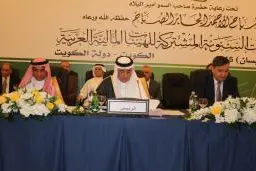PHOTO
Kuwait, 07 April, 2015
HE Obaid Humaid Al Tayer, Minister of State for Financial Affairs, participated in the sixth ordinary session of the Council of Arab Ministers of Finance. The Council was established in 2009 in order to enhance the coordination between Arab ministers of finance to help their respective countries face international financial challenges and achieve the common interests.
Commenting on the sixth ordinary session of the Council, HE Obaid Humaid Al Tayer, Minister of State for Financial Affairs, said: "For the sixth consecutive year, the Council of Arab Ministers of Finance continues to work within a specific strategy to ensure coordination of fiscal policies between Arab countries. This will enable them to deal with any developments in the global financial scene and to discuss them amongst each other, in addition to strengthening areas of joint action and promoting the exchange of expertise."
According to the meeting's agenda, members of the Council reviewed the materials included by the secretariat in the report, the working paper submitted by the International Monetary Fund on 'improving the fairness and efficiency of tax regimes in e Arab countries', and the working paper submitted by the World Bank on 'requirements to build human capital for productive employment in Arab countries'.
The Council reviewed the follow-up reports on the developments that occurred during 2014 and the actions carried out by joint Arab financial institutions on the five pillars of the United Arab Emirates' initiative to support economic stability in the Arab world. This initiative has been raised during the extraordinary meeting of the Council of Arab Ministers of Finance, which was held in September 2011 in Abu Dhabi.
HE said: "The five pillars of the UAE's initiative that aims to support economic stability in the Arab region were discussed thoroughly during the sixth ordinary session of the Council, in term of what has already been done or what is being implemented now. Those pillars include enacting legislations, creating employment opportunities, facilitating trade between Arab countries, attracting direct foreign investment and achieving food security, in order to support the financial, economic and developmental sectors in Arab countries."
The Council discussed the positions adopted by Arab countries towards the ongoing decisions and projects of the International Monetary Fund and the World Bank in addition to engaging in efforts to bring together these viewpoints to provide a suitable conclusion. Additionally, the Council discussed the latest developments concerning the activities of the G20 in addition to identifying the issues raised that are related to the economies of Arab countries.
Moreover, an agreement was formed on the messages that will be addressed this year to each of the Managing Director of the International Monetary Fund and the President of the World Bank. Those will be approved during the meeting and will emphasise the need to provide additional financial and technical support to Arab countries, taking into account the special circumstances those countries are going through that have affected their development and economic cycles. Furthermore, the messages will highlight the significance of expanding cooperation between international and Arab financial institutions in all areas, including the provision of funding and establishing partnerships to offer support, technical counsel, training and capacity building programmes.
-End-
For more information:
Osama Dagamseh / Mira Assaf / Ghaleb Zeidan
Weber Shandwick
Phone: +971 55 744 3346 / +971 50 3123518 / +971 55 560 8957
Fax: + 971 2 449 4833
Email: odagamseh@webershandwick.com; massaf@webershandwick.com;
gzeidan@webershandwick.com;
© Press Release 2015




















